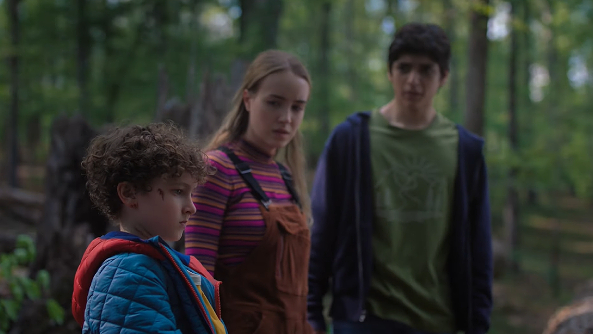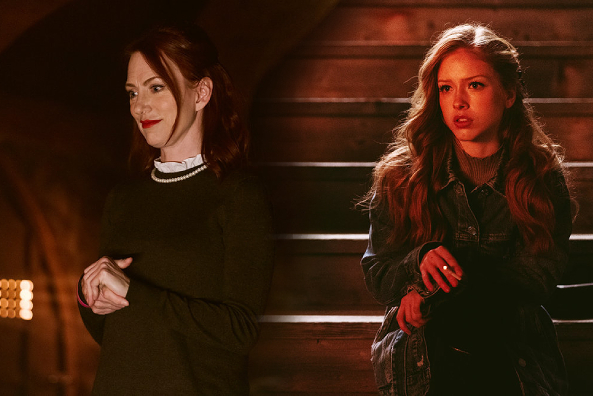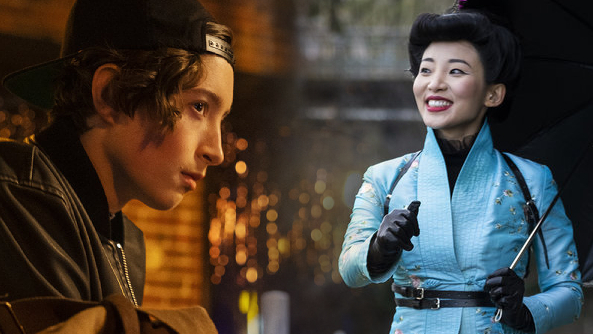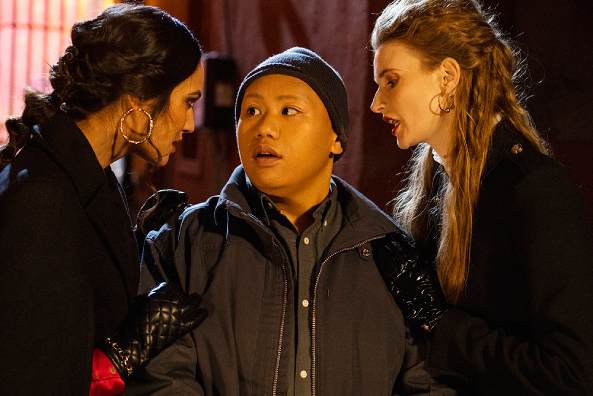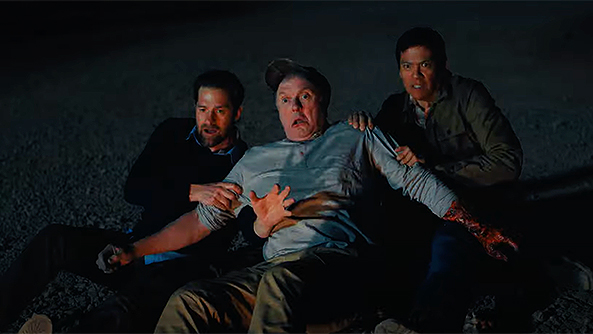At first glance, TV shows such as Californication, Legends, Sirens, and Perception have little in common. However, they all feature dramatic scores by Tree Adams, who also composed the score for season 3 of The 100. He has been composing for over 20 years, and utilizes both conventional sounds, such as gospel choirs and large orchestras, and the decidedly unconventional, such as wooden spoons and mashed potatoes.
OMFGTV recently had the opportunity to chat with the composer, who gave us a little insight into what he does and how he does it.
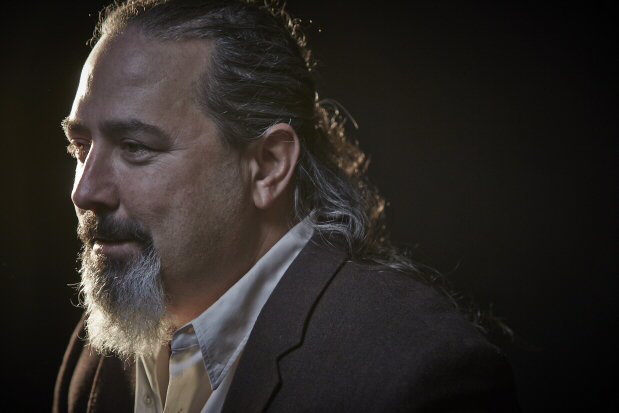 First, Adams walked me through his scoring process. He sits down with the show’s producers, and identifies places in a scene where things will change. They mark places where different pieces will start and stop, and try to work out an “emotional roadmap” of the scene. By then, Adams will be developing a sense of what melodies and motifs he wants to use to represent certain characters or relationships. As he uses the score to reinforce the story being told in the scene, he also thinks of longer arcs that will go on throughout the season.
First, Adams walked me through his scoring process. He sits down with the show’s producers, and identifies places in a scene where things will change. They mark places where different pieces will start and stop, and try to work out an “emotional roadmap” of the scene. By then, Adams will be developing a sense of what melodies and motifs he wants to use to represent certain characters or relationships. As he uses the score to reinforce the story being told in the scene, he also thinks of longer arcs that will go on throughout the season.
Next, he finally gets to the writing part of the process. He’ll use a Musical Instrument Digital Interface, or MIDI, which has recordings of sample instruments. He will then add live recordings, which allows him to get the results he wants from the strings and horns. Adams also plays a lot of instruments in the score for season 3 of The 100, such as the duduk (an Armenian woodwind instrument), the daf (a Persian frame drum), and the oud (a stringed instrument similar to a lute). Then he adds percussion, sometimes with several people banging on different drums all at once, which results in a big battle drum sound.
One of Adams’ favorite scenes to score was the one accompanying the cue “The Awakening,” Track 29 on The 100 Season 3 soundtrack, because of the emotion involved. The scene is at the end of episode 3×16, when the characters are awakening from the City of Light. He included nods to the themes of different characters, then when the scene cut to Jasper’s (Devon Bostick) despondency after coming out of the City of Light, Adams utilized Jasper’s cello motif.
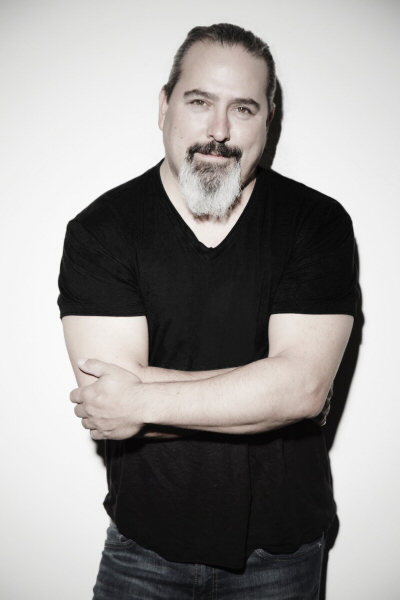 His other favorite scene to score was also in episode 3×16, the season finale, when Lexa (Alycia Debnam-Carey) shows up to rescue Clarke (Eliza Taylor) in the City of Light. “The two of them are trying to outrun all the ‘chippies,’” and Lexa tells Clarke that she’ll hold them off.
His other favorite scene to score was also in episode 3×16, the season finale, when Lexa (Alycia Debnam-Carey) shows up to rescue Clarke (Eliza Taylor) in the City of Light. “The two of them are trying to outrun all the ‘chippies,’” and Lexa tells Clarke that she’ll hold them off.
“And we see her do this hero shot in slow motion—I kinda love that moment,” Adams told me. “And I have this Clarke/Lexa theme, the Clexa theme, and we turn it heroic for that moment, and yeah, it’s just a classic. That was fun. I think Jason really outdid himself in the finale. I really like what he came up with for that.”
In contrast, the scene Adams found most difficult to score took place in episode 3×14, when ALIE (Erica Cerra) crucified Kane (Henry Ian Cusick). Not only was it difficult subject matter to work with, but it was also challenging to get the orchestra to play it with the frenzy that he and Rothenberg were looking for.
If you pay attention to the score while watching season 3 of The 100, you just might pick out some instruments that Adams often pairs with certain characters. For example, the cello is often used for Clarke, deep piano chords represent Bellamy (Bob Morley), and the psaltery (an ancient and medieval stringed instrument, similar to a harp) usually shows up when Roan (Zach McGowan) does.
I was curious about how Adams assigned instruments to characters, and what other characters were represented by instruments, and he shared that, “sometimes, a certain instrument or a certain melody just feels like it captures the essence of a character or a particular relationship.”
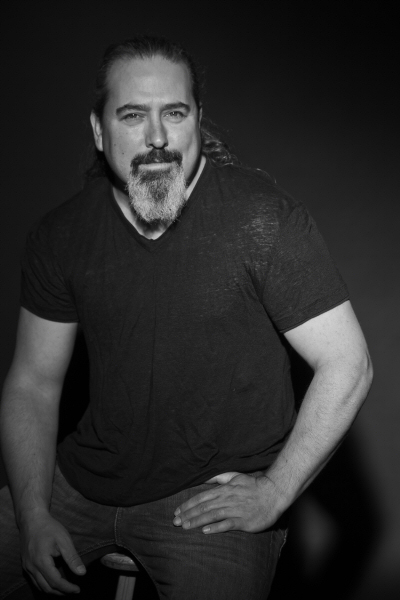 For example, he uses a low synth element with a modulation filter to represent Luna (Nadia Hilker). It feels like water to him, which ties to the water grounders, or Floukru, that Luna is in charge of, and he feels that the seriousness of the synth element speaks to Luna’s character.
For example, he uses a low synth element with a modulation filter to represent Luna (Nadia Hilker). It feels like water to him, which ties to the water grounders, or Floukru, that Luna is in charge of, and he feels that the seriousness of the synth element speaks to Luna’s character.
Ontari (Rhiannon Fish) was accompanied by a slinky Persian string motif, which emphasized her beautiful-but-dangerous nature and her untrustworthiness. Pike (Michael Beach) rolled in with big battle drums and a morphing string and bowed cymbal texture, which just said, “here comes Pike and his crew” to Adams.
“You come up with these things that sort of feel right for the characters—sometimes they’re a traditional instrument, like a cello or piano, and sometimes it’s like, you’re morphing different soundscapes,” Tree added.
I also asked Adams whether he would want to compose more vocal pieces for season 4 of The 100. He told me that he would welcome the challenge, if Jason Rothenberg, the showrunner, wants any. He added that he often had a woman named Lisbeth Scott sing wailing vocals in the score for season 3 of The 100, to add passion and mystery. We’ll hear more vocals from Scott in season 4.
Knowing how much Adams loves to represent specific ideas and characters with specific instruments, I asked if he had any new instruments lined up to use to represent the impending nuclear apocalypse in season 4 of The 100.
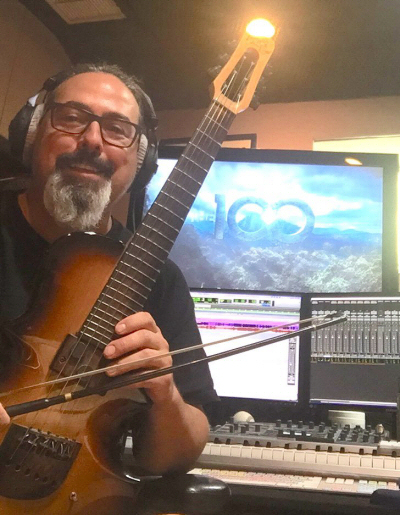 “There’s gonna be one instrument in particular that I commissioned somebody to make for me,” he shared. “It’s called a GuitarViol, and it’s basically a cross between a guitar and a cello, or a guitar and a viola…I feel like, having played one before, I know it’s gonna be perfect. So I had that one commissioned, and I’ll get to be using that in the new season. I’ve only read the first few scripts, and there’s a lot more left that I don’t know, so I’m waiting to see what’s in store.”
“There’s gonna be one instrument in particular that I commissioned somebody to make for me,” he shared. “It’s called a GuitarViol, and it’s basically a cross between a guitar and a cello, or a guitar and a viola…I feel like, having played one before, I know it’s gonna be perfect. So I had that one commissioned, and I’ll get to be using that in the new season. I’ve only read the first few scripts, and there’s a lot more left that I don’t know, so I’m waiting to see what’s in store.”
While it may be hard to believe after hearing his work, Adams wasn’t always a film composer. In fact, having picked up a guitar at the age of 10, he spent most of the ‘90s touring with a rock band called the Hatters. While he enjoyed it, he felt that there was more exploration to be had. He started experimenting with a MIDI program in the mid ‘90s, and a friend of his hired him to compose music for his independent film, “The Definite Maybe.”
“I started [composing], and I never looked back,” he told me. He loves storytelling through music, and composing is where he found that he was most comfortable and free.
When not composing, Tree Adams lives in Los Angeles with his wife and children. He is currently composing the score for season 4 of The 100.




